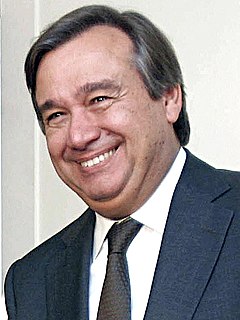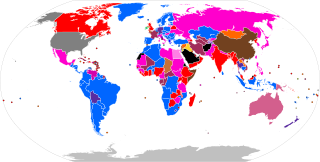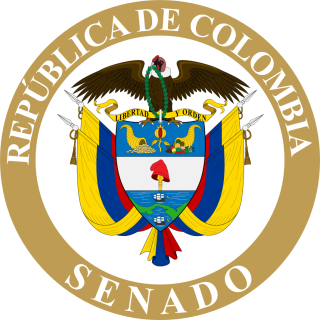
Party-list proportional representation systems are a family of voting systems emphasizing proportional representation (PR) in elections in which multiple candidates are elected through allocations to an electoral list. They can also be used as part of mixed additional member systems.
Several politico-constitutional arrangements use reserved political positions, especially when endeavoring to ensure the rights of minorities or preserving a political balance of power. These arrangements can distort the democratic principle of one person - one vote in order to address special circumstances.

Elections in Bolivia gives information on elections and election results in Bolivia.

The Portuguese legislative election of 1995 took place on 1 October. The Socialist Party defeated the Social Democratic Party under the lead of António Guterres, elected three years before, but missed the absolute majority by 4 MPs.

The Portuguese legislative election of 1987 took place on 19 July. In the previous election, in 1985, the Social Democratic Party had won a minority government managing to survive in coalition with the Democratic and Social Center and the Democratic Renewal Party, and after the approval of a no-confidence motion from the left-wing parties, with the aid of the Democratic Renewal Party, the government fell and Mário Soares, the President at the time, called for a new election.

The Portuguese legislative election of 1985 took place on 6 October. In June of the same year, the former Prime-Minister, Mário Soares, had resigned from the job due to the lack of parliamentary support, the government was composed by a coalition of the two major parties, the center-right Social Democratic and the center-left Socialist, in what was called the Central Bloc, however this was an unstable balance of forces and several members of each party opposed such alliance.

General elections were held in Uruguay on 31 October 1999 alongside a double referendum, with a second round of the presidential election on 28 November. The elections were the first in Uruguay since World War I that were not dominated by the Colorado Party and the National Party. The Broad Front had begun gaining popularity in 1994, and had become key player in Uruguayan politics by 1999.

An electoral system is a set of rules that determine how elections and referendums are conducted and how their results are determined. Political electoral systems are organized by governments, while non-political elections may take place in business, non-profit organisations and informal organisations.

General elections were held in Colombia on 21 April 1974 to elect the President, the Senate and the Chamber of Representatives. They were the first elections after the end of the National Front agreement, which had restricted electoral participation to the Conservative Party and the Liberal Party, with each party allocated 50% of the seats in both houses, whilst the Presidency alternated between the two parties.

Legislative elections were held to elect members to both chambers of Congress in Colombia on 9 March 2014. The nationwide constituency for the 102-member Senate was contested, as well as the 166 seats of the House of Representatives, plus the delegates to the Andean Parliament. There were 773 candidates for the Senate, 1528 candidates for the House of Representatives, and 23 candidates for the five Colombian seats in the Andean Parliament. 32,795,962 Colombians had been registered to vote in the elections by the cut-off date of 25 January 2014.
General elections were held in Dominican Republic on 15 May 2016 to elect a president, vice-president and the Congress, as well as 20 deputies to the Central American Parliament, municipal councils, mayors and vice mayors. On 15 May 2015 Roberto Rosario, president of the Central Electoral Board, said that there would be about 4,300 seats up for election in the "most complex elections in history".

General elections will take place in Uruguay in October 2019. If no presidential candidate receives a majority in the first round of voting, a runoff will take place in November 2019.

The next Hungarian parliamentary elections will be held in 2022.
Federal elections are scheduled to be held in Switzerland in 2019 to elect all members of both houses of the Federal Assembly.

Parliamentary elections were held in Rwanda on 3 September 2018, with Rwandan overseas voting the day before. The result was a victory for the Rwandan Patriotic Front coalition, which won 40 of the 53 elected seats while losing its absolute majority over the total of seats, whilst the Democratic Green Party and Social Party Imberakuri both entered parliament for the first time. With 49 of the 80 seats in the newly-elected parliament held by women (61%), the elections maintained Rwanda's position as the country with the highest proportion of female MPs.

Parliamentary elections was held in Mauritania in September 2018; the first round took place on 1 September, with a second round held on 15 September. At the national level, elections were held in 157 constituencies, each electing one member to the National Assembly. Elections were also held in 13 regional councils and 219 municipalities.

General elections are scheduled to be held in Panama on 5 May 2019. Due to constitutional term limits, Incumbent President Juan Carlos Varela is be ineligible for a second consecutive term.


















